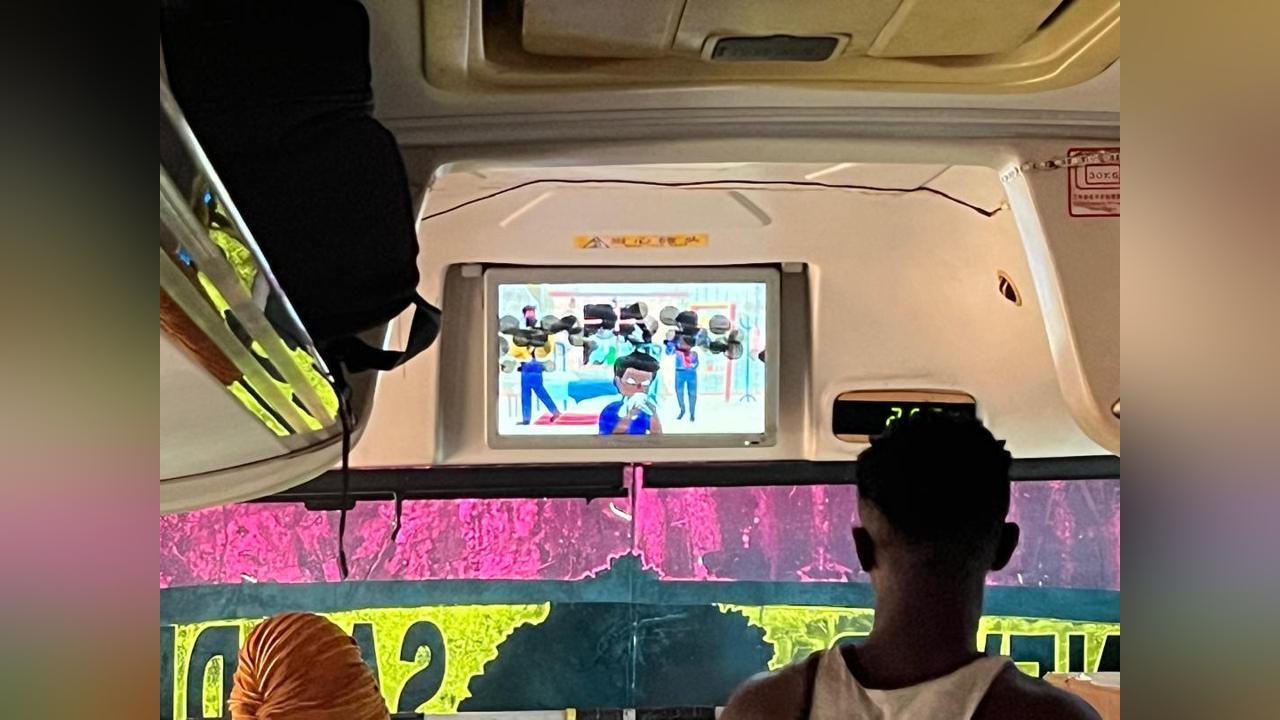Africa-Press – Ghana. When 39-year-old Phillipa Asare boarded a Royal VVIP bus from Accra to Kumasi, she expected the usual chatter and perhaps a Kumawood or Nollywood film to accompany the long ride.
Instead, a colourful animation rolled across the overhead screen, showing a coughing child beside a mother burning rubbish. The narration was in Twi, her native language.
“I thought it was a cartoon,” she laughed. “But then I realised they were talking about the air we breathe and how dirty smoke can make our children sick.”
Phillipa, a trader who frequently travels between regions, says she never imagined she was contributing to air pollution.
“Sometimes we burn rubbish to get rid of it quickly,” she admitted. “But now I see it differently. The video said it makes the air poisonous and dangerous to my health.”
Phillipa is one of hundreds of Ghanaians being reached through the Clean Air Awareness Bus Education initiative, which turns buses into mobile classrooms to educate the public about air pollution.
Turning transport into a tool for change
Supported by the Clean Air Fund (CAF), the campaign features animated educational videos in eight local languages, Twi, Ewe, Ga, Dagbani, Hausa, Nzema, Gonja, and English, shown aboard Royal VVIP intercity buses.
In the coming weeks, other transport operators will be brought on board to expand the campaign nationwide.
The goal is to share vital messages about the health impacts of air pollution and what individuals can do to reduce it, said Mr. Desmond Appiah, Country Lead for CAF.
“Air pollution has dire consequences on public health,” Mr Appiah said, citing World Health Organization reports linking about six out 10 diseases in Ghana to air pollution, with women and children being the most vulnerable.
He noted that transportation contributes about nearly half of urban air pollution in Ghana.
Almost half of Accra’s particulate matter (PM2.5) concentrations are attributable to road transport, which is linked to inadequate public transport infrastructure.
Seven out of 10 commuters in Ghana use privately run minibuses known locally as ‘Tro-tros’, which are often older, higher-emitting vehicles.
“We believe education is key to effective action and policy reform. If every passenger learns something, changes their behaviour, and calls for action, we move closer to improving public health.”
The videos, all under five minutes, use vibrant visuals and relatable storytelling. Topics include open burning, car exhaust fumes, the importance of trees, and household-level pollution reduction tips.
Madam Edith Atiaka, a Language and Content Development Team Member at Paje Multimedia, told, “This is not just a campaign. It is a journey to spark reflection and behaviour change, right where people are most reachable.”
A silent killer in the air
Air pollution is now considered one of Ghana’s leading environmental health threats. According to the WHO, nearly 28,000 premature deaths in Ghana each year are linked to poor air quality-mostly from heart disease, stroke, lung infections, and asthma.
Children, the elderly, and low-income communities are disproportionately affected, exposed to high levels of pollution from traffic, cooking with charcoal or firewood, and burning waste in the open.
“Most people do not realise that what they do in their backyard or by the roadside is making others sick. That is why grassroots education like this is so powerful,” said Madam Florence Kuukyi, Metro Public Health Director for the Accra Metropolitan Assembly.
Transport operator and passengers as ambassadors
Mr Joseph Hayford, Manager of Royal VVIP Transport, said offering their buses for the campaign was a way to support public service.
“A few of our vehicles emit smoke, and now I know from the videos how that affects people. We’ll get them checked and fixed as soon as possible,” he said.
He added that he learnt something new: engines should not be left idle while waiting at stations. “The video explained that idling pollutes the air. So, we will advise our drivers to turn off their engines.”
Madam Selina Amoah, Acting Director of the Environmental Quality Unit at the Environmental Protection Agency (EPA), praised the initiative.
“We need to reach people in a way they understand. This campaign does just that.”
A breath of fresh hope
For Comfort, the video had an immediate impact.
“When I get home, I will tell my daughter not to burn rubbish anymore.”
Her story, like the clean air videos, is simple but powerful. And it’s the kind of story that could multiply across Ghana, one bus ride at a time.
Source: Ghana News Agency
For More News And Analysis About Ghana Follow Africa-Press







